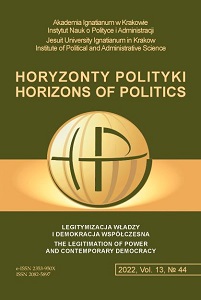Innowacyjność współczesnej teorii demokracji w perspektywie historycznej
Innovativeness of Contemporary Democratic Theory in a Historical Perspective
Author(s): Iwona Barwicka-TylekSubject(s): Political Philosophy, Political Theory, Political Sciences, Government/Political systems
Published by: Uniwersytet Ignatianum w Krakowie
Keywords: democratic theory; liberalism; freedom and equality; Thomas Hobbes;
Summary/Abstract: RESEARCH OBJECTIVE: The aim of the article is to introduce a metatheoretical framework that allows to discuss contemporary theories of democracy and identify the limitations of democratic innovation. THE RESEARCH PROBLEM AND SCIENTIFIC METHODS: The main research problem is the identification of the intellectual source of the so called “paradox of democracy” (Ch. Mouffe) related to the inconsistency of the “liberal” (represented by B. Constant) and the “democratic” (Rousseau) approach to values such as freedom and equality. It is suggested that this source is the private public division exposed by T. Hobbes and radicalized in many ways later on. The tool of analysis is the three level model of the political system as described by C. Offe. RESEARCH RESULTS: The analysis leads to the conclusion that contemporary democratic innovations can be placed between the extremes determined by procedural democracy on the one hand and illiberal democracy on the other. That is, however, what puts their innovative character into question. THE PROCESS OF ARGUMENTATION: The main part of the article is historical and philosophical analysis. The limitations of the modern political language in respect to the notion of democracy are presented. CONCLUSIONS, INNOVATIONS, AND RECOMMENDATIONS: The article advocates understanding democracy as the limit of the European political experience.
Journal: Horyzonty Polityki
- Issue Year: 13/2022
- Issue No: 44
- Page Range: 71-84
- Page Count: 14
- Language: Polish

